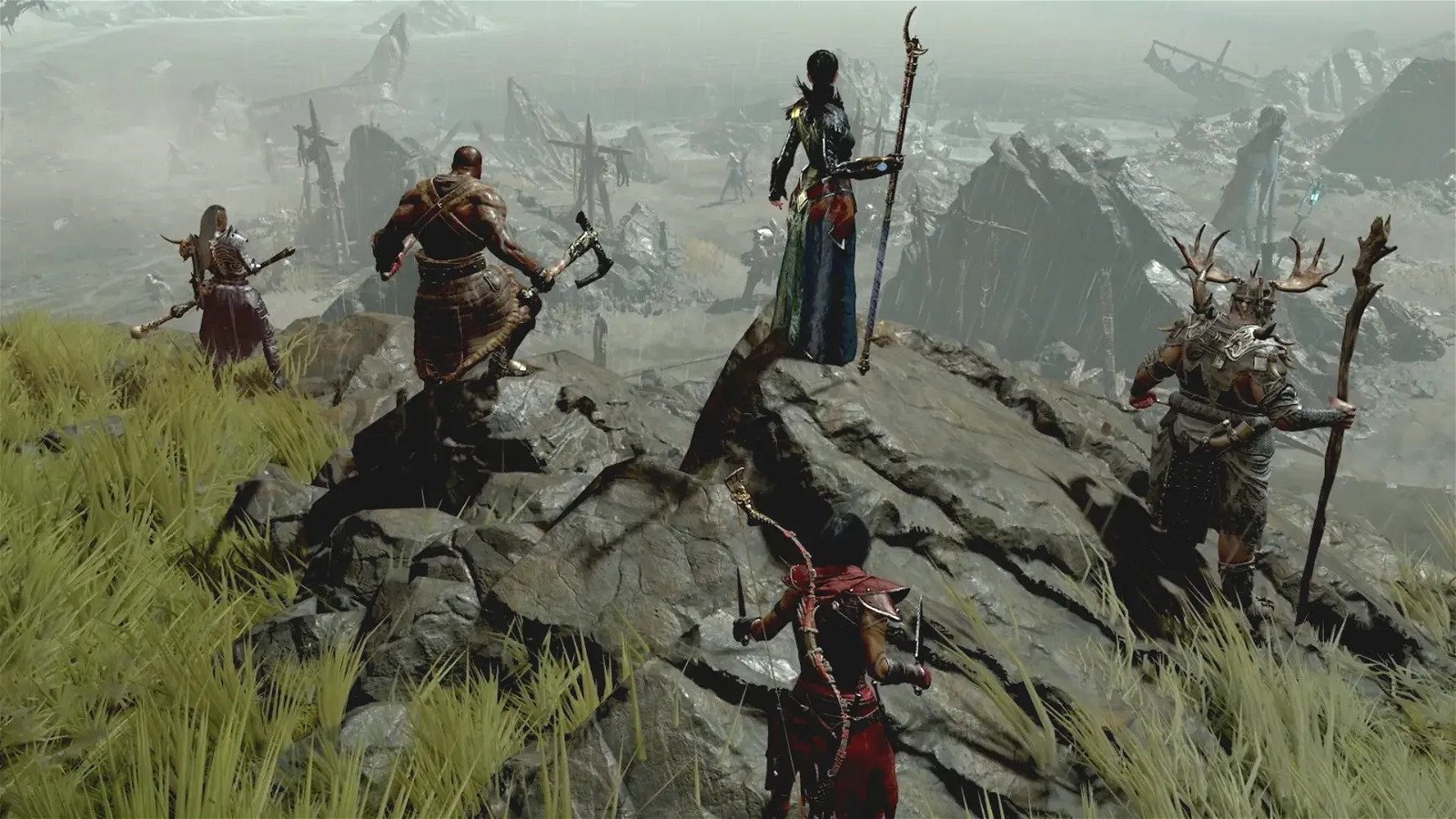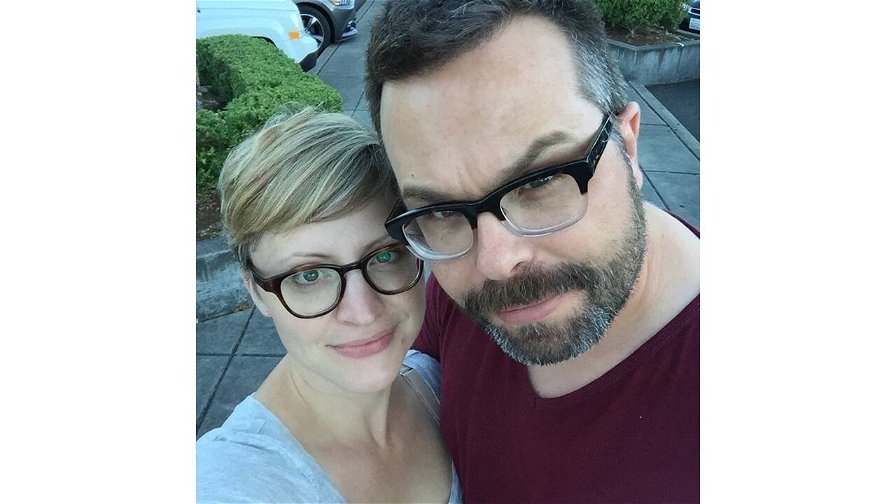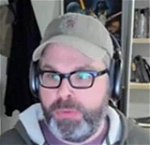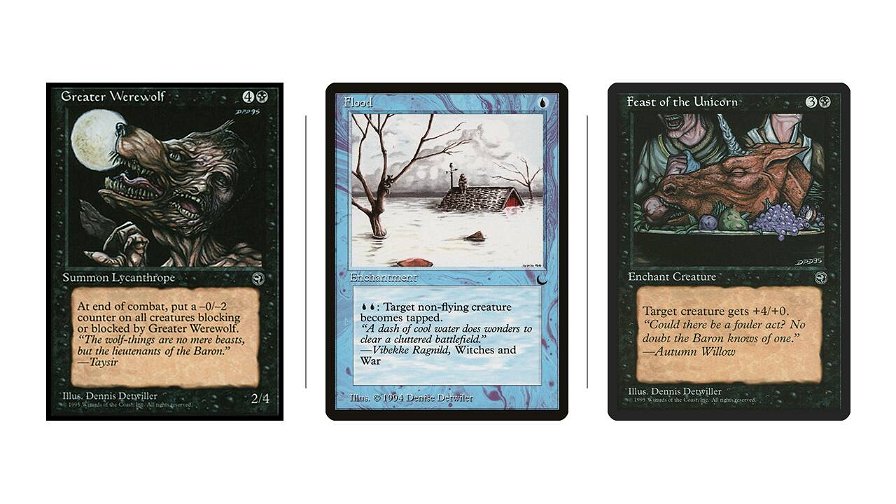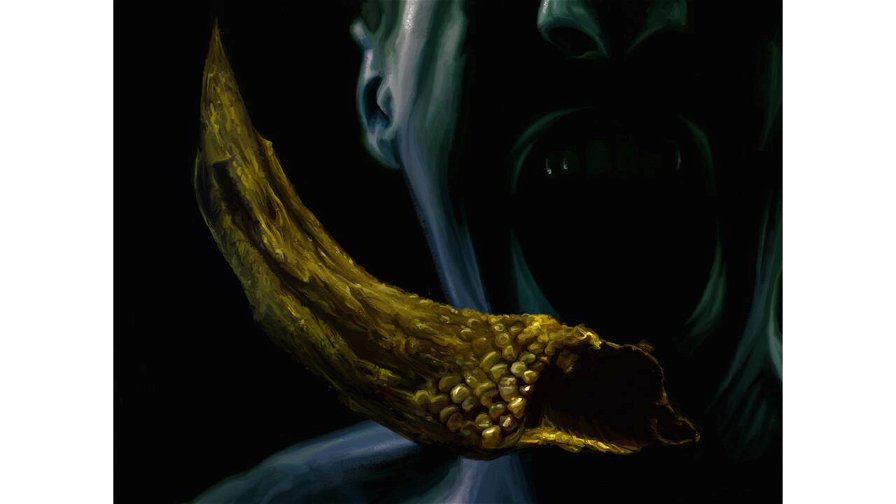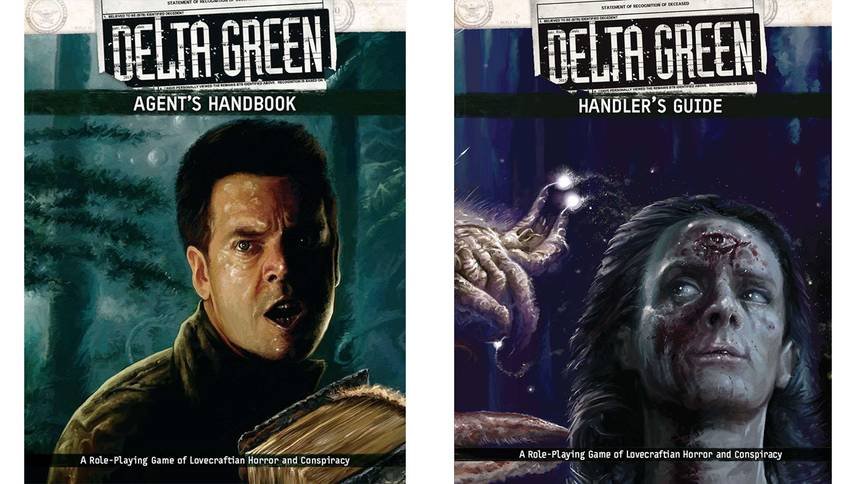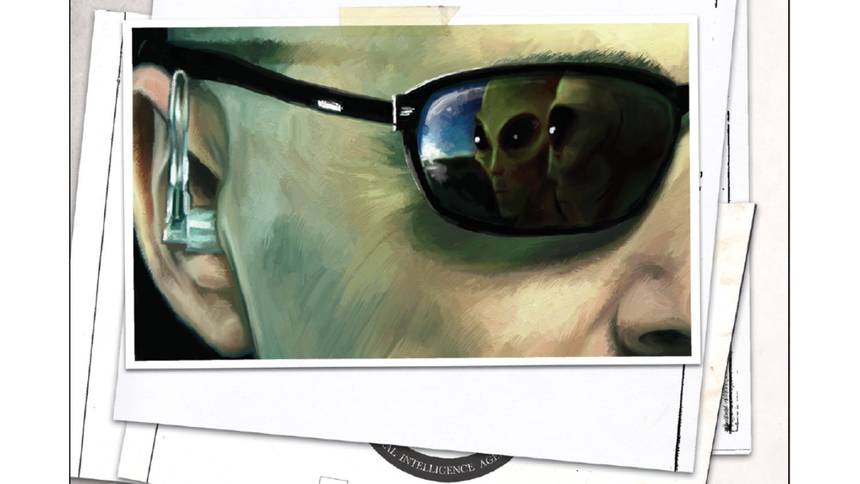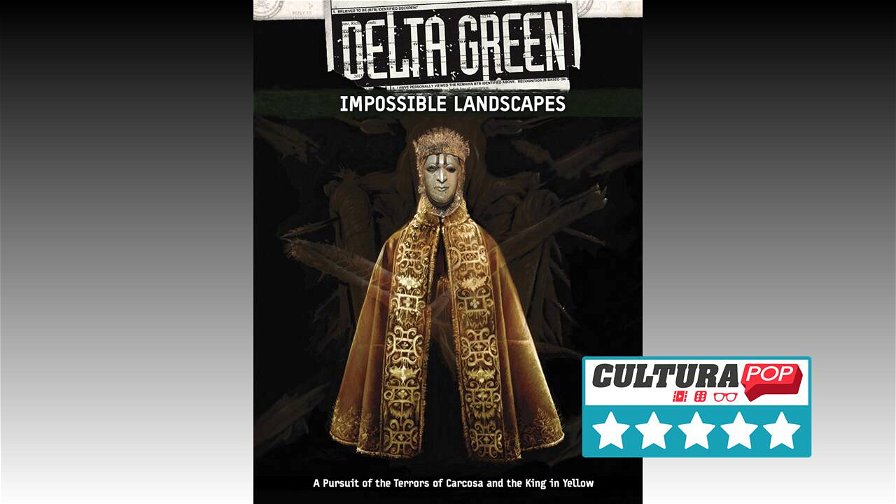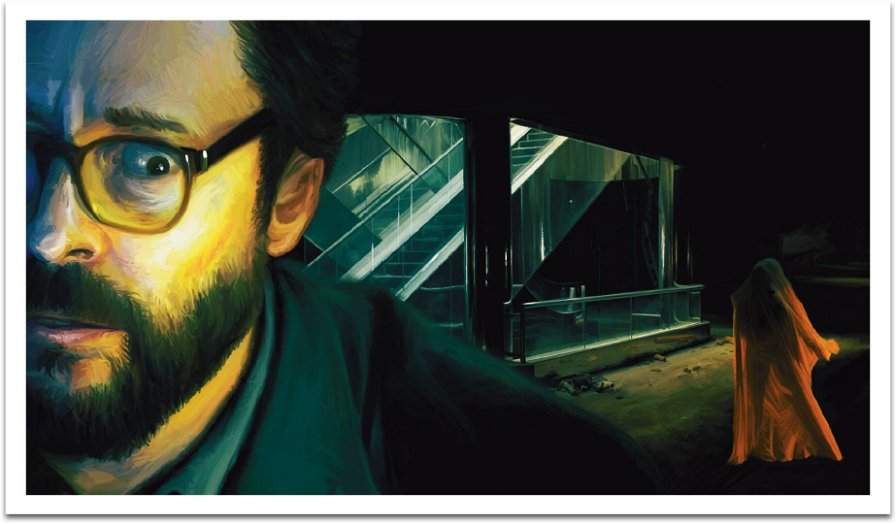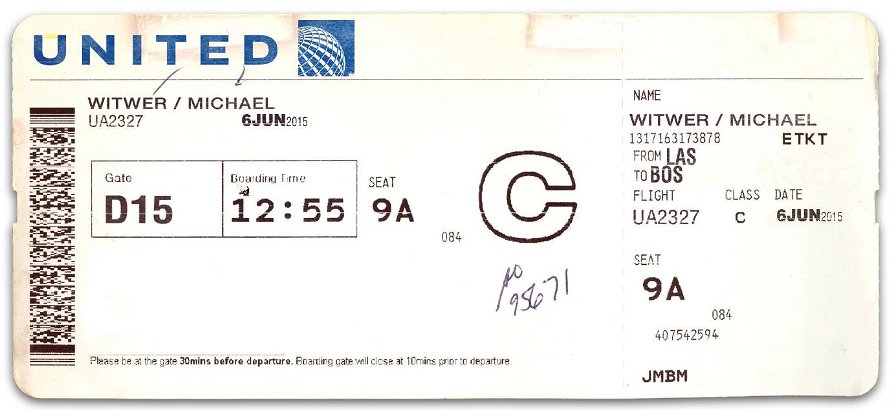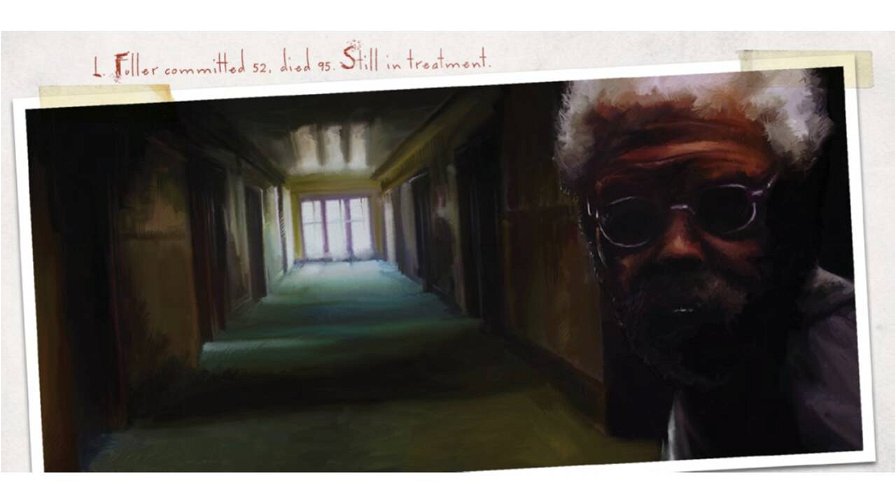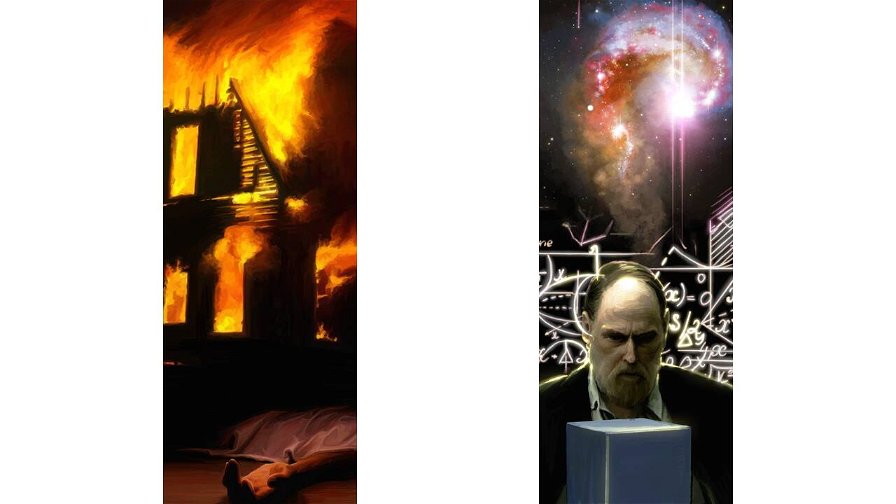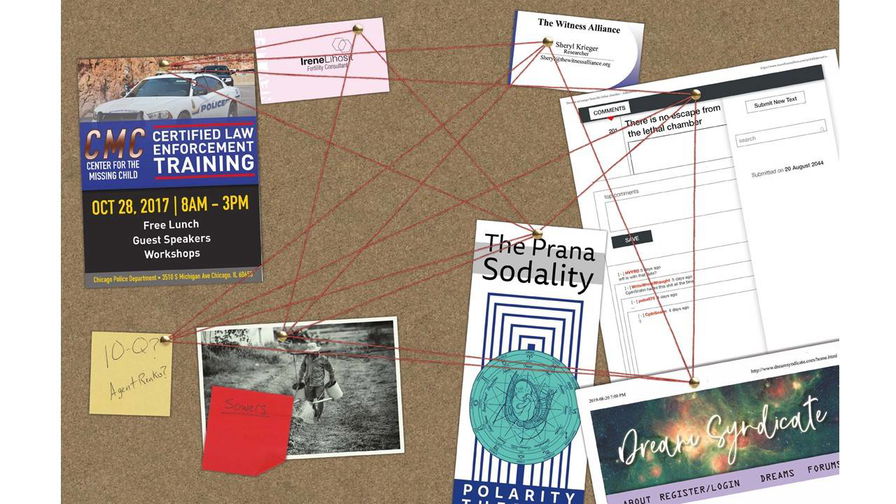In recent days, we had the privilege of being able to connect via Skype with the Canadian city of Vancouver to interview Dennis Detwiller, one of the authors and illustrator of the Delta Green RPG and author and illustrator of the campaign Delta Green: Impossible Landscapes, centered on the figure of The King in Yellow and all the mythology derived from it, which was awarded with our Pop Culture Award. During the interview, many topics were covered, from the evolution of Delta Green from its first edition in 1997 to today, to a digression on The King in Yellow and the reason that makes this late 19th century book so fascinating for fans, passing through the creative process that gave life to Delta Green: Impossible Landscapes.
The interview with Dennis Detwiller
Hi Dennis, thank you for your time. We know that you are Co-founder and Creative Director of Arc Dream Publishing as well as author of many role-playing games published by Arc Dream Publishing and other publishers. You were also, along with John Scott Tynes and Adam Scott Glancy, author of the original 1997 edition of Delta Green, as well as the current edition. Tell us something more about yourself: when did you approach the world of role-playing games? What prompted you to become a game designer and then start your own publishing house?Hi Davide, it’s a pleasure. I've always pretty much played role-playing games since I was 12 and 13. I grew up in New York City so I had a good access to all this stuff, it was all over, you could find it anywhere. D&D, Gamma World, Star Frontiers, Marvel Superheroes… All that stuff.
And I don't know how I got into this stuff, as professionally I just kind of wandered into it. I developed videogames for 15 years, I helped create Magic the Gathering, the original sets of Magic the Gathering. I just do random stuff and it kind of either happens or it doesn't. A lot of stuff fails, but a lot of the stuff that I've worked on has been a success and I'm really happy about that.
You are also the leading artist who has done the magnificent illustrations of all of Delta Green's books: when did you approach the world of illustration?
Right, right, so I began as an illustrator in New York. I was obsessed with becoming a comic book artist and I worked for Marvel and DC and other companies when I was younger, when I was a teenager.
I went to college at a place called School of Visual Arts, for illustration, and I had teachers like Will Eisner and others amazing world shaking artists, who taught me a ton. And the first thing the comic book guys, the pros, taught me was: “Don't go into comic books, you will make no money. You will be poor and you will be miserable”. So, I took their advice and went and the first job I really wandered into was Magic: the Gathering, which I don't know how aware most people are. The first sets paid amazingly well for artists, like I know artists who retired based on doing a couple Magic cards, so I really lucked out there.
What are the differences in approaching the creation of a role-playing game from the point of view of an author and that of an illustrator?
Illustration is its own thing, I still love it, I still do it all the time, I did it all for Delta Green because I want the look and design to be consistent. It's just a personal thing as an art director, but I hate games that look like 63 different people illustrated them, it's totally inconsistent styles. So what I wanted was like drab realism with supernatural and unnatural weirdness kind of popping out of page, so I said: “Ah, screw it, I'll just do it myself!” And that was a mistake because I'm like 5.000 images in now, but I love it still.
Um, writing is, is gonna upset a lot of people, writing is extraordinarily easy compared to art. Drawing is a giant, giant pain in the ass that you sometimes have to throw the whole thing out. I've often told the story I'll repeat it basically. I said this to a writer and they got very upset, and I said: “Okay, I'm going to show you how easy writing is. Imagine you're in a coffee house in Washington and it's pouring rain and the moody blues are on the radio and there's a cat asleep on the table and your tea is steaming. You look out the window and it's just a wave after wave of lights going by on the highway”. I said: “I'm done, now paint that”.
Oh yeah, of course, yeah, I see your point.
So, you could transport people so quickly with writing, something that takes years to paint could take minutes to explain perfectly and you immediately put them in the right brain set. So, that's what I love about writing, it's really grown on me and I split my time evenly between writing and art now.It used to be almost all art and maybe a little writing at the beginning of Delta Green, now it's a toss-up every day I'm working on something new, but it's either art or writing for Delta Green so.
We have published a rather comprehensive review of the two Delta Green Core Books, and we also talked about it with Shane Ivey in a previous interview, but I want to take advantage of the presence of another one of its authors, therefore, explain us, what is Delta Green?
Okay, Delta Green it's about the end of humanity, it's about a situation we can never win or understand or stop, we can only stave it off momentarily at best and we do that by destroying ourselves. So, the Agents who investigate these unnatural events and hide them from the general public, they do so knowing it's like radiation, it's killing them. It's killing them mentally, it's killing them physically and they're taking it out on their family while they're doing it. It's about the human cost of stopping the infinite. And for me that's the core of Delta Green, it's a horror game about not being able to understand even what you're fighting, you just have to fight it.
And how has Delta Green changed from 1997 to today?
This is interesting, um, this is kind of a high level statement, but basically it's gone from a techno thriller conspiracy oriented, Tom Clancy kind of feel with unnatural elements, to a much darker, nothing works, everything's falling apart. So, that in the new game there are two Delta Greens, there's the conspiracy of illegal Agents and then there's Program, and even the Program is a criminal conspiracy within the federal government: they're stealing things they're stealing budgets and time.
So, it's become if anything darker than 1997, which is saying a lot because it was pretty dark in 1997. It's about double dark now.
I loved Delta Green from the beginning in ‘97, and when I bought the new one and I didn't find Karotechia or Majestic 12 I was a little bit shocked in the beginning… But I understand that also the view that people have of conspiracies has also changed, in the 90s it was different...
Uh yes, totally, when we came up with it, when we conceived of Delta Green and we said: “Let's do this thing called Delta Green” it was 1992-1993. So, you know, X-Files hadn't even come out yet. I loved Majestic 12 and UFO books and Scott Glancy and John they loved that. So, you know, that was all new and novel at the time, it hadn't really delved that deeply on it in the public mindset. Lots of fringe people like myself had read books on it, but you didn't see it on Saturday evening TV. But now that's commonplace, so we had to move the entire thing in a kind of slightly different direction again to make it uncommonplace, and that's kind of where we're at now.
But as far as like the Karotechia and Majestic, Majestic is the Program, that's the most important takeaway I can give there, but the Karotechia were always meant to be a ridiculous thing your players killed, they were never meant to be a real lasting threat, they were meant to be: your guys were supposed to go down to South America and blow up La Estancia and burn the frozen nazi dude. They were built to be something you could kill, and they were never going to institute the forthright and take over the world. If it wasn't just for that, I mean, hell they worshiped Nyarlathotep and they didn't even know it, they thought they were talking to Hitler or whatever, so they were always goofy and meant to be blown up. I've always thought they were kind of funny, I'd love to see bases and locations of the Karotechia still out there but as far as agents of the Karotechia or something, they'd be ridiculous goofs that you can kill.
Now, let's talk about the Impossible Landscapes campaign, the latest Delta Green product that bears your signature as author and illustrator. It is all centered around The King in Yellow and reading the preface in the book by John Scott Tynes, it’s clear that this Delta Green campaign is a work that has matured over decades of work. What can you tell us about it? How did the idea for this campaign come about? How did it develop? And most important, when and where did you see the Yellow Sign?
Of course! You know, John Tynes wrote an article in The Unspeakable Oath in 1991 called The Road to Hali, which was kind of about The King in Yellow and I love that article so much, then he wrote a section for Delta Green Countdown, which is just kind of like The King in Yellow for Delta Green, and I wrote Night Floors in response to that, which is a scenario that has been rewritten entirely and is part of this campaign.
And we've always traded back and forth the idea of maybe doing a role-playing game based on The King in Yellow. And John wrote an entire kind of outline of like: “I imagine the campaign would might look like this” and it was a couple pages of like really great ideas that had these cool hooks.
And I said: “Well I'm just gonna go do it!”. So, I did. I pitched it and we put it up on the Kickstarter and it was extremely popular. And I think I pitched 128 pages book and it's 360 some odd pages, it's a nightmare, huge.
So, you know, it really ballooned, it wasn't like I was ever struggling to make it work, it just kind of threw itself out of me and ran all over the page. And then John read it and went: “Oh this is great, I love this”, and I went: “Oh okay, it's done, I did it!”. Because it had to kind of go in a big loop back to John, it was my high level feeling.
In fact, if you want a picture of John he is “Author X”; if you look in the book if you see that little black and white picture of the guy in the hat, that is John Tynes, he's the author of The King in Yellow.
So, have I seen the Yellow Sign? Yes, multiple times! I have it hanging on my wall here.
It was a glorious amount of work, it took years. I had to paint all of it, I had to do all the maps and then, to make matters worse, I decided we were going to have two fictional characters have a handwritten throughout the book, in red and blue, and that was a whole other level of nightmarish complication. But I'm really happy with the way it came out, it's reviewing really well, people seem to like it, so it's very nice.
In my opinion, I think that we can say that Impossible Landscapes is for Delta Green what Masks of Nyarlathotep is for Call of Cthulhu…
I really hope so, I really tried to do that. You know, I knew Larry, who wrote Masks of Nyarlathotep, really well and I have nothing but the deepest respect for Masks, I just thought it was the greatest thing ever in 1986. When I first got my copy, I just was in love with it from that moment and yeah, this is definitely an attempt to make something as big and as grand and as sweeping and character changing, as Masks was for me, for Delta Green.
So, thank you that's great, that's great.
What were the biggest challenges you faced in developing Impossible Landscapes?
You know, high level it's always just the amount of raw work. A lot of people who are creating game books, they set a date, they decide this will be out in March 2022 and they truncate all their work to make March 2022. Don't have the map for page 360? Okay well, we'll just publish it without it.
We've never done that. With Pagan Publishing, Arc Dream, Delta Green, any of those books. We literally will not release the book if we don't feel it's the best thing we have ever done to that point. We will fight and scream and throw books at each other me and Shane, yell at each other on the internet every day going: “no, no, no, we can't do that!”, to make sure these books live up to the quality we have promised. So, that's the hardest thing to overcome in every Delta Green book, is it good enough internally, not will it check the boxes or will the people go, okay.
Honestly, I'm not making these, this sounds incredibly selfish, but I'm not making these books for the people who read the books, I'm making the book for me and for Shane and for John and for Scott. And if they love it, I know I'm on to something and if they are like: “eeeeeeh” (Dennis gestures with his hands making the "so-so" gesture), then I know we need to keep going. So, for Impossible Landscapes there was huge gouts of time where it was just raw writing, going off to Shane and Shane reading and going: “but what about, but what about, but what about…” and then I had to write into higher sections or cut things.
And I’m glad I did and I ran it eight times, me just me, including once on Role Playing Public Radio, which was great fun. So they have a recording of the original sessions, where I kind of created a lot of this in my head.
So, yeah, a lot of time goes into creating and then the arts and then… It's a whole thing, but it's the most satisfying job I know, I love it.
I saw that, to support Handlers and players, for Impossible Landscapes were also created a PDF with a lot of handouts given with the book, a fictional website and Delta Green: STATIC Protocol, an optional book that should be out soon, in PDF too. What can you tell us about these elements?
Oh sure, so the handouts were like a central portion of the game I wanted, there's nothing quite like sitting down at a game and finding a clue and then being handed something, it just feels great, you feel like you're in the world. So I started the game thinking that Impossible Landscapes would be filled with these things and these things, since The King in Yellow is about insanity in the world changing, these things would be otherworldly and strange and hidden with cryptographic clues.
And you know, there are things hidden in those books that nobody has found yet, that I hope someday someone will find, but they're there. So, I love putting that together.
Delta Green: Static Protocol is a collection of all the kind of history of The King in Yellow that's introduced in the book, so if you have Impossible Landscapes you have all the text from Delta Green: Static Protocol. This is all clipped up properly for players to hand out. It's the timeline in the beginning of the book and it's all just sorted so you know where to search for it and do you find it, make a roll and then here you go. So that's kind of what that is.
About the website, Shane did that Shane wanted to create a site as it would have appeared in 1995. So, a terrible looking, flashing, you know kind of like, I don't know if you remember the internet back then, it was awful. So we wanted to look like that and to be immediately useful for players, if they were looking up a demon or you could find the demon listing and the description of the demon. We thought that was neat. Shane did all that work and God bless him, he took it to an end degree, and I love when he does stuff like that.
Reading the introduction in the Impossible Landscapes book, it’s possible see how the horror in this campaign differs substantially from that normally present in Delta Green and in the other products centered on the Cthulhu Mythos, and that it shows a very interesting surrealist drift that brings to mind, among the others, the Twin Peaks by David Lynch and The OA. What are the reasons behind this choice?
You know, I've always been a huge fan of surreal horror like The Shining or things that play upon perception and the choice was: The King in Yellow in Delta Green is about that. The mythos that John kind of laid out for Delta Green of The King in Yellow is: it's a book that destroys reality. You read it, your whole world just sails off the deep end and anything is possible.
He ran games for us when we were playing, that were just so fantastic and cool and just surreal and weird that they shaped my entire way of thinking about that kind of stuff. And what I love about it is, you know, when I've run it, I've run it for groups where they play a normal Delta Green game, and then they go into Night Floors and they realize everything from the normal Delta Green game and their life and all their Agents lives it's just some backdrop and it's not real.
I believe they played a game called A Victim of the Art, which is a scenario I wrote, and then they went into Night Floors and they went backstage in Night Floors and opened a door, and it was the kid's room from A Victim of the Art, all those props set up and put it away as if someone had unpacked the room and put it here. So, I described it to them there specifically, to drop it on them later in Night Floors. They were shocked: “That was on Long Island, that was two years ago, how do they have this kid's stuff here…”. And the players just lost it.
So, surreal horror is about showing that the mythos is just this other fictional thing, The King in Yellow encompasses the whole world and you're just starting to understand a little bit of how wrong you got reality. It's just not at all what you think it is.
Oh, yeah, when I was reading this part of the book, I immediately thought about Schopenhauer’s philosophy, it's like when the Veil of Maya has torn apart and you can see the reality. It recalled me also Kult role-playing game…
Yes, exactly, something like this.
The King in Yellow, Carcosa and all the rest of the mythical imagery created by Ambrose Bierce and Robert W. Chambers have attracted a multitude of other authors over the years, including Lovecraft himself. They made them their own, in a more or less coherent way or completely distorting them as in August Derleth's Mythos, up to their "consecration" in the first season of the TV series True Detective. What do you think is the reason for so much fascination?
Well, it's really important to understand Robert Chambers position in the creative gist of the world. He was probably one of the most famous authors of his time, he was an amazing illustrator, he did the cover of The Saturday Evening Post, he was a professional painter. So, he was the whole package he did everything and the obsession with The King in Yellow, I think, this is my own personal point of view, is that it's one of the first books, or stories or movies or whatever, about a work which is referenced but never seen. It's the MacGuffin. When you watch Pulp Fiction and he opens the briefcase and you see the gold light you never find out what that gold is, you ever see it, there's a lot of theories.
Chambers did that in 1895 in a book, he said: “Oh The King in Yellow, you read it, you go insane”. And you went: “Well, I want to read The King in Yellow!”, and he went: “no, no, no, no, no, here's a little quote, but that's the best you're going to get! We're never going to explain why or how exactly it happens”.
And everybody just went nuts about it, they loved it. And he wrote romance novels mostly, The King in Yellow was kind of a side dalliance and it has some weird romance stuff in it near the end, but I think that's the draw. It's the draw of the you can never know what the MacGuffin is, that's the central message of the book. Also, it's a weird alternate history book. It's like a suicide chambers in 1920s New York, it's you're like: “where am I? What's going on?”, and then it just kind of flows from there. Great love for that book still, I read it every year.
Despite having a good circle of fans, Delta Green is little known in Italy, but we are trying to make it known as much as possible, considering it one of the best RPGs on the market. What do you want to say to the Italian players to convince them to try Delta Green and to play Impossible Landscapes?
Oh well, you know, it offers a real unique a mechanic and that mechanic is the Bonds and the Sanity, the way they work together. In certain other games when you lose some sanity, you go: “Well, I have 33 and I'm gonna be okay, I'm good”. In this, it's much more like: “Well, if I argue with my wife or get divorced, I can end up losing this many Bond Points, instead of taking the Sanity”. And it shows the degeneration of the Agent “live”, in real time, so your Agent is like going to get kicked out of his house, he's going to be evicted, he's going to lose his job, and these things make the game much more realistic and fun.
Because they lead to wonderful role-playing experiences, where you're stuck, telling your manager why your Facebook page says you're in Cincinnati when you told him you were at home sick. You're actually hunting a monster that you know is invisible and sucks someone's blood out, you can't tell him exactly what's going on, but he saw you, so you know you're gonna lose your job. And I love moments like that, we really wanted to kind of get to the core of moments like that.
So, as far as the Italian players go: mystery, intrigue, conspiracy, backstabbing and the greatest threat is almost always another Delta Green agent. It’s fantastic and just leads to really fun gameplay. When you pull something off in Delta Green it's almost despite everything, there's a very low probability you're going to defeat whatever is out there. The best you can hope for is: you see it, you confirm it's something no one wants to screw around with, and you run like bastard and tell A Cell there's a giant temporal wasp living in a cave out there that could read minds, and hope they deal with it and it's just great fun.
And about Impossible Landscapes, I can almost guarantee it will offer you a new type of horror. It will take you in very strange places and leave you alone, scared and terrified. You don't understand how you're gonna get back and what I love about it is: the eight times I've run it, each time has been utterly unique, not even close to the other. No one has repeated the same path.
Some people have gone, you know, we have one agent just go: “You know what? F… Delta Green! F… The King in Yellow! I'm getting a cabin, nobody's coming, I'm not telling anybody where I'm going”. He went out there, had a couple encounters with the King all alone in a cabin in New Brunswick, came screaming back to the group. But it was a great. We had a guy who went to prison and he continued to haunt him in prison, awesome.
Impossible Landscapes is huge, it's deep, it's interrelated to a level that I've seen few products pursue. As far as like dates, times, characters, connections… There are five connections in there that nobody has discovered yet, and I'm waiting for someone to go: “Hey, isn't this, this?” and then I go: “oh yes!”. So, I'm waiting for those moments and they're gonna come naturally out of gameplay: one player is going to look at these clues and go: “Ooooh!”, and I can't wait.
To conclude, I also wanted to ask you if you have a regular play group and what games are you playing now.
Yeah so, the good news is my regular group is my same group from 1985 onward. They're all over the United States and we play on Roll 20. We were playing D&D for several years, D&D5e which we had a great time with, but most recently, for I guess about a year now, we've been playing The One Ring. And we love The One Ring, Francesco is a good guy and we know him really well. he's a friend of Arc Dream and I love his game, my players love his game. They're all huge Tolkien fans, so really comfortable there.
And I run Delta Green for them from time to time, they're the original group with whom I created The Fate and Stephen Alzis for Delta Green. In 1987 or 88 I ran Call of Cthulhu for them, set in New York, where they were fighting these weird wizards and that's where all that came from, and the ghouls and the tunnels… And yeah, it was quite fun.
So, they're by test group still, and I run stuff for fans sometimes and Shane, you know, when I have time.
Thanks again Dennis for your time and your friendliness, it was a real pleasure talking with you!
Thanks Davide for the interview! It was fun talking to you.


